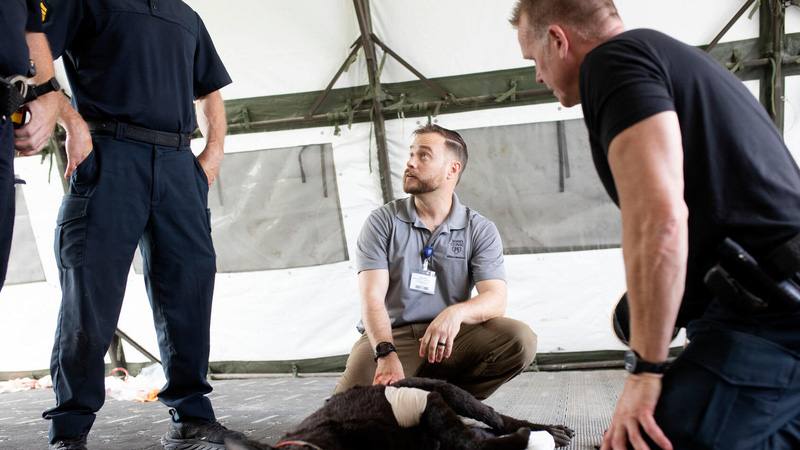-
News Cycle
Former Army Ranger found his path to medical school through Mayo Clinic’s Military Medicine program

Jessie Milaski was a medic in the U.S. Army's 3rd Ranger Battalion who served two tours of duty in Afghanistan. After leaving the Army 12 years ago, he worked as a paramedic with local emergency agencies in Florida, a U.S. State Department medic in Somalia and a medic at a field hospital set up in New York City during the early days of the COVID-19 pandemic.
Throughout, Milaski worked to support veterans and active-duty military personnel while steadily pursuing his medical education. In 2019, he signed up for a Mayo Clinic Military Medicine course in Phoenix, and that turned a key for him.
"It was the special operations tactical medics course. I came here for five days, and it was phenomenal," he says. "I realized I want to be involved in this — I had no idea how, but I knew this is what I was going to do."
Milaski completed his undergraduate degree in emergency medicine, and in 2021, he applied to the Military Fellowship program at Mayo Clinic in Arizona. He spent two years in the fellowship then applied to medical school at Mayo Clinic Alix School of Medicine, where he is now in his second year of studies.
"Attending the Military Medicine course in 2019 was the epitome of medical education for me," Milaski says. "I loved everything about it and my goal was to attend medical school. I never thought someone like me would actually get into a place like Mayo Clinic."
Fellowship program offers veterans a pathway to medical education and clinical practice
Milaski credits the Military Medicine fellowship program with the opportunity for veterans such as himself to gain the training and experience needed to prepare for medical careers in the civilian world, while continuing to serve the military community.
"For me, the fellowship was a vital bridge between my military experience and the academic rigor of medical school," he says. "It helped me transition from hands-on, operational medicine to a more evidence-based, academic approach. Teaching during the fellowship solidified my understanding of medical concepts and gave me a greater appreciation for the educational process. Most importantly, it gave me the confidence to apply to Mayo Clinic for medical school."
Since 2019, the fellowship program, which serves the enterprise with a home base in Arizona, has provided recently retired special operations medical personnel the opportunity to expand their clinical and medical education skills. The fellowship prepares an individual to become an independent educator in military medicine and can be a pathway to medical school or other training. Advancing existing competencies and skills while developing new ones is a key education priority at Mayo Clinic.
"The fellows ensure that what we teach is relevant and aligned with the needs of military medical personnel," says Pierre Noel, M.D., Military Medicine medical director and a retired U.S. Air Force lieutenant colonel.
The fellowship program, which is funded by the Leona Helmsley Foundation, is in keeping with Mayo Clinic's historical commitment to supporting U.S. military personnel and their training, says Melissa Barr, Military Medicine administrator. "The journey from military service to medical school at Mayo Clinic embodies the deep-rooted tradition of excellence that not only defines Mayo Clinic, but also our Military Medicine program."
Military Medicine currently has two fellows, who serve from one to 2 ½ years. Information on the program is available online or by contacting Elizabeth Adado, Military Medicine program manager.
"Jessie’s story is a testament to how the values of service, education, and leadership converge at Mayo Clinic," Barr says.
Veterans Day honors those who served and sacrificed for America
Milaski, 36, grew up in a small town in New York state and attended community college after he graduated from high school in 2006. He was the first in his family to attend college. "But I didn't have a focus or goal," he says. "I didn't have a lot of money, and I felt directionless."
He enlisted in the Army in 2008 and was stationed at Fort Benning (now Fort Moore) in Georgia as a medic in the 3rd Ranger Battalion of the 75th Ranger Regiment, which has a storied history tracing back to World War II. "I picked the medic job out of the blue. No one in my family had been in the medical field, but I talked with a few people, and I knew I wanted to be a soldier but help people, too. Early on, I said I wanted to keep doing medicine and go to medical school eventually."
After leaving the Army in 2012, he worked at a variety of medical-related jobs and served in the National Guard for three years. It was the experience at Mayo Clinic in 2019 that began to bring all the puzzle pieces together. "When the fellowship opportunity at Mayo came up, I knew I had to take the leap," he says. "It was a whirlwind — moving across the country with only a month's notice during a pandemic — but I've always found that growth comes from putting myself in uncomfortable situations."
At Mayo Clinic Alix School of Medicine in Arizona, he's focused on anesthesia and critical care. "It's the perfect next step to apply the skills I developed as a Special Operations Medic, where quick decision-making and high-stakes interventions were essential," he says. He's hopeful that his medical studies lead one day to a staff position at Mayo Clinic in Arizona.
On Veterans Day, he plans to attend the observance at the Mayo Clinic Scottsdale campus before going to class.
"For me, Veterans Day is about honoring those who dedicated part of their lives to serving our nation. The military community has shaped who I am today, and as a future physician, my goal is to continue giving back to that community."







